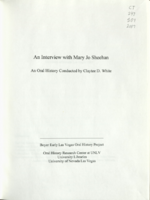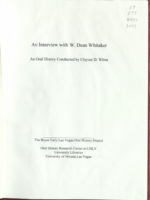Search the Special Collections and Archives Portal
Search Results

Transcript of interview with Doris, Gerald and Marcy Welt by Barbara Tabach, November 30, 2014
Date
Archival Collection
Description
Interview with Doris, Gerald "Jerry", and Marcy Welt by Barbara Tabach on November 30, 2014. In this interview, the Welts discuss how they came to Las Vegas in the early 1970s from California, and Eli Welt's pawnshop, Stoney's, which he acquired from Doris's father, Jerry Fox. Jerry and Marcy talk about how they met and came to Las Vegas, where Jerry worked for Harry Reid's law firm. They talk about the community that existed in Las Vegas at the time, and their involvement with B'nai B'rith.
Just before the start of the Great Depression, Doris Fox was born in Detroit, Michigan. At the age of fifteen, she met Eli Welt, and the two were married three years later in Alexandria, Louisiana, where Eli was stationed with the United States Army Air Corps. Eventually, Doris and Eli moved to southern California with their three children-Gerald (aka Jerry), Richard (aka Rick) and Susan (aka Sue). In 1971, after all their children were out of the house, Doris and Eli moved to Las Vegas. They followed Doris' father, Jerry "Stoney" Fox, who had moved to the city in the 1940s, and was one of the first entrants into the local pawnshop industry. Like many migrants to the city, Eli became active in the Jewish community, particularly with B'nai Brith and Jewish Family Service Agency. Doris and Eli's eldest son, Jerry, and wife, Marcy, moved to Las Vegas in 1972 with their two small children. Tiffany and Cory. Jerry and Marcy had met through a Jewish youth group as teenagers in Anaheim, California. Having just finished law school, Jerry found that legal career opportunities were plentiful in the growing city. His first job was as a law clerk with Harry Reid's law office, Beckley, DeLanoy, Jemison and Reid, later becoming an associate attorney. He assisted Reid as lieutenant governor and on his early political campaigns. Jerry left Beckley, DeLanoy, Jemison and Reid to work for Oscar Goodman's firm-Goodman, Snyder and Gang-focusing on civil litigation. In 1975, Jerry opened his own practice, continuing to specialize in civil ligation, and served as general counsel to Las Vegas Clark County Library District. Since their arrival, Marcy and Jerry have been dedicated to community service, particularly within the Jewish community. Both were active in youth programs at Temple Beth Sholom, Jerry even serving as youth commissioner and later, education director. Marcy worked with Edythe Katz at the Holocaust Resource Center and assisted with producing a film and training program for educators. Both are avid supporters of youth travel to Israel and work hard to ensure these opportunities continue to be available for those interested.
Text

Transcript of interview with Robert Brown by Ian McLaughlin, February 23, 1981
Date
Archival Collection
Description
Text

Transcript of interview with Celia Rivero Grenfell by Patricia Hollard, March 31, 1977
Date
Archival Collection
Description
On March 31, 1977, Patricia Holland interviewed Celia Rivero Grenfell (born 1926 in Las Vegas, Nevada) about her life in Southern Nevada. Grenfell first talks about her family background in Mexico and later describes her family’s restaurant business. She also describes her education, recreational activities, Downtown Las Vegas, and Helldorado. The two also discuss racial segregation and prejudice, the El Rancho Vegas, Lorenzi Park, early churches, environmental changes, early air conditioning, and Grenfell’s early work in a laundry business.
Text

Transcript of interview with Louis Fisher by Samuel Barto, March 20, 1978
Date
Archival Collection
Description
On March 20, 1978, collector Samuel Barto interviewed paint and drywall contractor, Louis Fisher (born July 10, 1922, in Alva, Oklahoma) in North Las Vegas, Nevada. The interview took place at the collector’s home with the collector, Mr. Barto and Mr. and Mrs. Fisher present. Mr. Fisher relocated to Las Vegas in 1953 after having lived in Alva, Oklahoma, Portland, Oregon, and Walla Walla, Washington. During the interview, Mr. Fisher discusses the history of Las Vegas from 1953 and offers key insight into the rapid growth of Las Vegas with special focus on the Strip, banks, the steady influx of people moving to Las Vegas for the warm climate, and housing.
Text

Transcript of interview with Mary Jo Sheehan by Claytee D. White, July 14, 2009
Date
Archival Collection
Description
Mary Jo Sheehan shares detailed memories of her family's early history, her father's search for work in mines in Oklahoma, Colorado, New Mexico, and Arizona, and her education through high school. She recalls with clarity the family's move to Henderson in 1945, her first job at Nellis Air Force Base, and their home in Victory Village. Mary Jo recalls bowling at the Emerald Casino, joining a sorority, and dining at the Frontier Hotel as part of her social life. She also remembers where she and her husband met in 1963. They were married at a friend's house first and later recommitted in a ceremony at St. Peter's Catholic Church. In recounting her career, Mary Jo talks of working at Nellis Air Force Base, then RFC War Assets Administration, the Colorado River Commission, and Basic Management Incorporated. Most recently she has done volunteer work for St. Rose Hospital and the Clark County Museum. Mary Jo shares many memories from her long history in Henderson, Nevada. These include events such as the PEPCON explosion in 1988 and the renovation of downtown Henderson beginning in the 90s; people like Hal Smith, Pat McCarran, and Selma Bartlett; and places such as the Swanky Club, the Emerald Casino, and the Black Mountain Golf Course. The fascinating end result is an overview of all the growth and changes in Henderson since the late forties.
Text

Transcript of interview with Bud Weil by Claytee White, December 9, 2003
Date
Archival Collection
Description
Bud Weil worked as a disc jockey in Mexico after serving in the military during World War II. In 1947, he moved to Las Vegas to work at KLAS but after two days he was job hunting. His search landed him at KENO, a radio station owned by Max and Laura Belle Kelch. His was an interview show that afforded him entree to stars performing in town. The list of his favorite interviews includes Sophie Tucker, Sammy Davis, Jack Benny, The Mills Brother, Rosemary Clooney, Leno Home, Joey Lewis and many others. In 1955, he became restless, left the career in broadcasting, and joined Max Kelch as a partner in a new venture for Las Vegas - Musak. This enterprise took him to the doors of every business in town and shortly, he knew everybody. He uses that knowledge in this interview to talk about all aspects of life as the town grew over the years. Today he is a senior statesman of our town, enjoying everything about Las Vegas except the traffic.
Text

Transcript of interview with Dean Whitaker by Claytee White, April 5, 2010
Date
Archival Collection
Description
William Dean Whitaker was born in 1925 and raised in a suburb of Los Angeles, California. Dean, as he is known, talks briefly about his parents and his brothers, for his youth quickly ended when he joined the Air Force and became an aviation cadet once he had turned 18 years old. The year was 1943 and World War II was raging. He became a member of the 398 th Bomb Group and flew twenty missions before being captured by the Germans. In this oral history, Dean talks with vivid recollection of the day he was captured and details of being a POW in Germany. Among his anecdotes are those of his mother's unwavering belief that he would return home, the humanity of a German soldier, and of meeting Gen. George Patton. Included are photos and excerpts from his personal history of his life during the war. Dean and his wife Lucille moved to Las Vegas in 1990.
Text

Transcript of interview with Jim Marsh by Claytee D. White, June 5, 2012
Date
Archival Collection
Description
Jim Marsh in Denver, Colorado. Father was the chief for the Colorado Patrol. Mother lived in Nebraska. Jim split time in both places while growing up. He was a service member of the Army and once getting out of the service he started his work with his father at a Ford dealership. Jim went on to work and own dealership in several different areas, Colorado, California, New Mexico, and Washington states before arriving in Las Vegas, NV in 1971. Once arriving in Las Vegas Marsh purchased a dealership called American Auto Mart. Around 1976 Jim Marsh bought the Santa Fe Saloon along with the twenty lots surrounding it for 12,500. This was his first experience in the gaming industry Marsh was the only dealership in the world for 25 years to have a gaming license in a new-car dealership. Marsh discovered interest in Belmont when there was a lone resident Rose Walter. The two bartered and Jim gained land in Belmont and went on to build a bar and church for the town. Marsh eventually went on to own the Skyline Casino. Jim Marsh founded the Nevada Auto Auction in 1987 on Las Vegas Boulevard South Eventually sold it and used the investment to build the Longstreet Casino. Marsh was' also a member of business organizations, Better Business Bureau and The Red Cross Marsh has been a member of the Salvation Army Advisory Board for at least 25 years. Tonopah is another location that Marsh has invested in. After leasing the gaming at the Mizpah Hotel to later buying the Valley Bank building and moving the gaming from Mizpah. It is still successful today. He also purchased the Tonopah Station House which is a hotel bar, and restaurant; along with owning the grocery store Scolari's next-door. Tonopah has proved to be a very good investment for Jim Marsh.
Text

Interview with Charles McWilliam, January 11, 2005
Date
Archival Collection
Description
Text

Interview with Joyce Anne (Reese) Parkhurst, November 27, 2004
Date
Archival Collection
Description
Text
